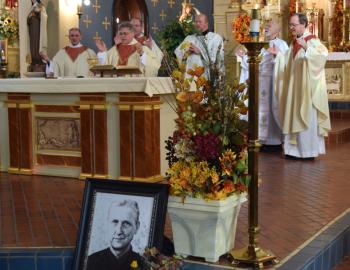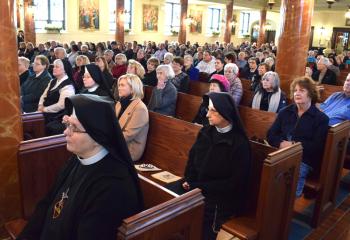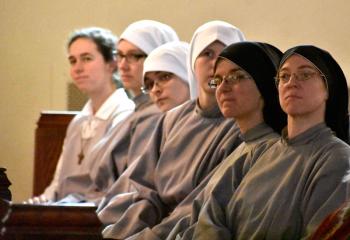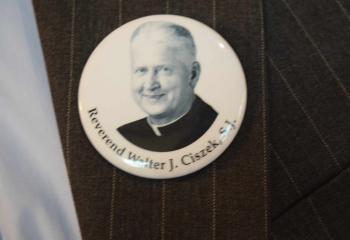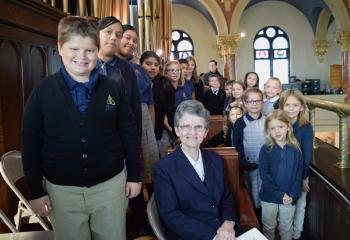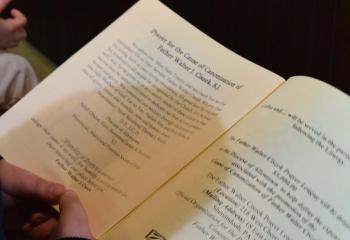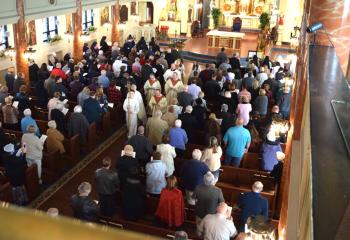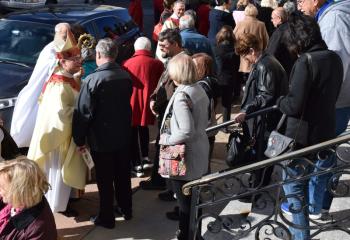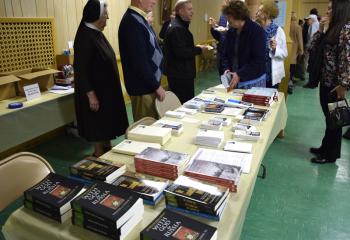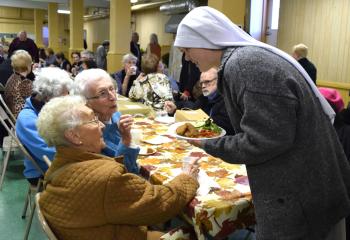By TARA CONNOLLY Staff writer
“Today we look at Father Walter Ciszek’s steadfastness to the Gospel while living in a harsh environment. So much of his example is needed today because, we too, are living in a harsh time,” said Bishop of Allentown Alfred Schlert, Oct. 21 during a special Mass imploring prayers for the advancement of the diocesan native and Jesuit priest’s cause for canonization.
Bishop Schlert was the principal celebrant for the 34th annual Father Ciszek Day at St. Casimir, Shenandoah, which serves as a sacred worship center for Divine Mercy Parish, Shenandoah and was the home parish of the priest, who was a prisoner in the Soviet Union for 23 years.
Concelebrants were Monsignor Ronald Bocian, pastor of Divine Mercy; Father Jeffrey Walsh, pastor of St. Maria Goretti, Laflin; and Monsignor Myron Grabowsky, pastor of St. Michael Ukrainian Greek Church, Shenandoah.
Also concelebrating was Father Eugene Ritz, the newly named co-postulator for Father Ciszek’s Cause for Canonization, diocesan chancellor, director of the Office for Diaconate Formation and chaplain at Notre Dame High School, Easton.
Father Ritz was named co-postulator after this year’s deaths of Monsignor Anthony Muntone and Father James Sable, who served as co-postulators.
“It’s great for all of us to remember Monsignor Muntone and Father Sable in a special way because of their great devotion,” said Bishop Schlert.
“You especially have heard Monsignor Muntone speak as a native Shenandoahan of his great love for Father Walter. He dedicated so much of his priesthood to researching. and also praying and deepening his knowledge of the life and devotion to Father Walter Ciszek.”
In his homily, Bishop Schlert told the faithful that Father Ciszek would not recognize today’s Church that has been sidelined to the four walls of a church building.
“We live at a time where there is great pressure to live the faith,” he said.
“It is becoming more and more difficult to hear our voices in the marketplace.”
He also called to mind the caring evangelization Father Ciszek offered to those who imprisoned him and how he overcame the temptation to bitterness.
“He accepted them as his brothers and sisters. He saw them as people of God,” stressed Bishop Schlert.
“But today we are more and more coarse and treat each other harshly. We have a growing disregard for people. That’s what the communists did,” he noted.
In addition, he said, Father Ciszek understood that since all people were created in the image and likeness of God – he refused to develop hatred and bitterness for others.
“It’s hard for us to do that in our country. We have become more and more polarized,” said Bishop Schlert.
By becoming polarized, Bishop Schlert said, many people tend to only talk to people who think like them, which pushes people further into their corners.
“Father Walter calls us to something radically different. He calls us to see someone – who is opposed to us – as a friend, who is deserving of our love and respect,” said Bishop Schlert.
The remedy to counter becoming polarized, according to Bishop Schlert, is to heed Father Ciszek’s practice of giving up control and turning himself over to the will of God.
“The message of Father Walter is to free ourselves from control and put our trust in God. That is what sustained him,” he said.
“We can’t have an imprisonment of thoughts that hardens our hearts.”
He encouraged the faithful to become liberated from control and inspired by Father Ciszek’s refusal to harbor harsh thoughts, hatred and bad views of others.
“Then we will truly know how Father Ciszek lived his life in the most desperate of situations,” said Bishop Schlert.
After Mass, light refreshments were sponsored by the Father Walter Ciszek Prayer League.
The league also presented the diocese with $5,000 to assist with the costs of the cause for canonization.
Who Was Father Ciszek?
Father Ciszek was born Nov. 4, 1904, in Shenandoah. He was ordained in 1937 as the first American Jesuit in the Byzantine Catholic Rite.
He secretly entered the Soviet Union in 1939 as a missionary priest and was arrested in 1941 as a Vatican spy. He was imprisoned, accused of espionage, trapped in the Moscow prison of Lubianka during all of World War II, and sentenced to 15 years of forced labor in the prison camps of Siberia.
After 23 years as a prisoner, he was released with another prisoner and returned to the United States in 1963 after being exchanged for two Russian spies.
Father Ciszek co-wrote “He Leadeth Me” and “With God in Russia,” along with Jesuit Father Daniel Flaherty.
Father Ciszek died Dec. 8, 1984, the Solemnity of the Immaculate Conception of Mary.
His cause for canonization began in the Ruthenian Byzantine Catholic Eparchy of Passaic and was later transferred to the Roman Catholic Diocese of Allentown. His cause has reached the stage that it is currently being reviewed in the Vatican.
Father Pascual Cebollada, General Postulator of the Society of Jesus, oversees the processes toward beatification or canonization of all Jesuits.



